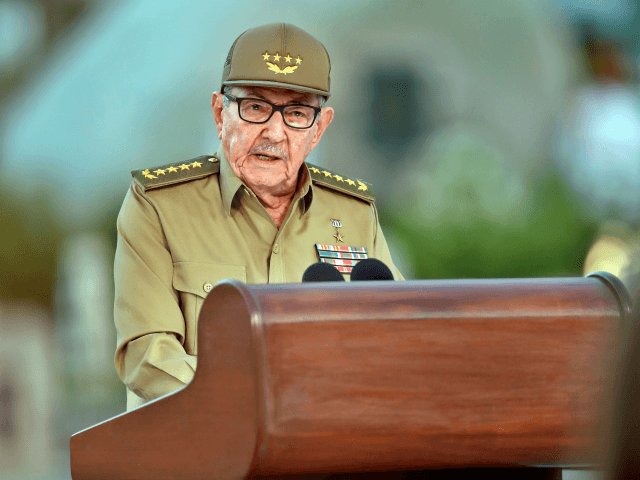The U.S. Department of State designated Cuban dictator Raúl Castro and four family members on Thursday, banning them from entering the United States and strengthening the case against them for “gross violations of human rights.”
Castro remains the head of Cuba’s Communist Party and its armed forces, which makes him the most powerful man in the country. Last year, he handed over the title of “president” – the head of the nation’s rubber-stamp legislature – to Miguel Díaz-Canel, creating the false impression that he had let go of the reins of power.
In the State Department’s announcement of the new designation – pursuant to Section 7031(c) of the FY 2019 Department of State, Foreign Operations, and Related Programs Appropriations Act – Secretary of State Mike Pompeo said that all of the identified Castros “have been involved in significant corruption or a gross violation of human rights.”
Raúl Castro and three of his children – Alejandro Castro Espín, Deborah Castro Espín, Mariela Castro Espín, and Nilsa Castro Espín – are officially banned from entering America. Alejandro has run the nation’s counter-intelligence (espionage) services for years and helps his father control the military, though he has taken a less public role since the beginning of President Donald Trump’s tenure. Mariela is the head of the Cuban state-run queer association, CENESEX, which works to repress LGBT Cubans who demand rights from the communist regime.
Deborah and Nilsa do not hold public office, but both are married to high-ranking Cuban military officials. The Cuban military controls not just the nation’s defense infrastructure but owns all major tourism “businesses” on the island and plays a key role in keeping the socialist dictatorship of Nicolás Maduro in power in Venezuela. Estimates suggest there are between tens of thousands and 100,000 Cuban government agents operating in Venezuela to keep Maduro from facing a coup.
Pompeo accused Castro and his family of significant crimes against humanity in his statement announcing the new sanctions.
“As First Secretary of the Cuban Communist Party, Raul Castro oversees a system that arbitrarily detains thousands of Cubans and currently holds more than 100 political prisoners,” Pompeo said. “As First Secretary of Cuba’s Armed Forces, Castro is responsible for Cuba’s actions to prop up the former Maduro regime in Venezuela through violence, intimidation, and repression.”
“In concert with Maduro’s military and intelligence officers, members of the Cuban security forces have been involved in gross human rights violations and abuses in Venezuela, including torture,” the statement elaborates. “Castro is complicit in undermining Venezuela’s democracy and triggering the hemisphere’s largest humanitarian crisis, forcing 15 percent of the Venezuelan population to flee the country and precipitating a food shortage and health crisis of unprecedented scale in this region.”
The Cuban people have suffered under the brutal Castro regime for over half a century, but Pompeo concludes by promising the people of Venezuela that America “will continue to pursue all diplomatic and economic tools to help the Venezuelan people achieve the transition they deserve.”
While Pompeo prioritized the Venezuelan people over the Cubans in his statement, the designation will help the Cuban exile community make a legal case in international court against the Castro regime for crimes against humanity. Justice Cuba, an independent commission compiling the legal evidence for precisely such a case, has successfully urged at least three Latin American countries to consider leveling charges of crimes against humanity against the Castro regime.
With probable cause, any nation in the world can bring charges of crimes against humanity against an accused individual, typically a world leader. The legal definition of crimes against humanity is a series of acts “committed as part of a widespread or systematic attack directed against any civilian population, with knowledge of the attack.” The United Nations lists “murder, extermination, enslavement, deportation or forcible transfer … imprisonment, torture, rape, [and] sexual slavery” as examples of the acts that constitute evidence of the crime.
The Justice Cuba commission has presented before the Organization of American States (OAS) evidence that the Castro regime has, in the past 60 years, run labor camps to enslave political dissidents, holds prisoners of conscience, has murdered and tortured dissidents, and killed refugees fleeing the country, including children as young as five months old. The Castro regime has also aided terrorist organizations such as the Revolutionary Armed Forces of Colombia (FARC) and Hezbollah, and offered refuge to American criminal refugees such as Joanne Chesimard, who killed a police officer in 1973.
The Cuban regime has not, at press time, responded to the Castro family designation on Thursday. Instead, the official newspaper of the Communist Party, Granma, featured Díaz-Canel clamoring for Cuba to invest more heavily in “ideological preparation” to “dismantle the imperialists’ schemes.”
“There is not a single person or group that can assume with commitment moments like these if they are not well prepared ideologically, if they don’t know the origin of this situation, which is part of the battle against the empire” Díaz-Canel said at an event on Thursday. Cuban communists refer to America as “the empire” derisively; Díaz-Canel was referring to the Trump administration’s pro-human rights policies against Cuba. “We are dismantling the imperialists’ schemes, we are dismantling the imposition of neo-liberal colonization that they want to impose on us.”

COMMENTS
Please let us know if you're having issues with commenting.